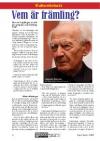Vem är främling?

| Upphovsperson: | Rydström, Olof |
|---|---|
| Medarbetare: | Nadolski, Michał |
| Utgivare: | Fjärde Världen |
| Tidskrift/källa: | Fjärde Världen |
| År: | 2013 |
| Ämnesord: | Rasism och främlingsfientlighet, Kulturell identitet och gemenskap, Sociologi |
Georg Simmel analyserar främlingsbegreppet.